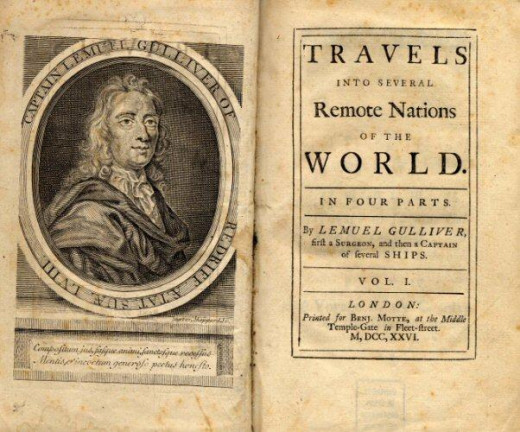Gulliver's Travels: A Sad Man's Revenge

In 1724 a 58-year-old Irish clergyman and pamphleteer who wrote under various pseudonyms sought refuge in Woodbrook, a quiet country house in County Laois some seventy miles west of Dublin. As the acting Dean of St. Patrick’s Cathedral in Dublin, he was a distinguished figure in clerical life. But never has a renowned churchman had as profane a reputation.
His frustrations were many. Naturally a hypersensitive man, the native Dubliner had been vying for glory in English politics, first as a Whig propagandist, then as a recruit for the opposing Tories, who found his biting honesty and satirical wit useful. He had been in an out of love with many young girls who found his intellect fascinating and irresistible but uncontrollable. He had offended Queen Anne through his blasphemous satire A Tale of the Tub, after previously alienating King William for including information about the indiscretions of Sir William Temple as editor of the latter’s memoirs. He and his printer had been convicted of seditious libel in 1720 (and later exonerated) for the publication of Drapier’s Letters, a series of pamphlets opposing the English-ordered minting of copper coinage in Ireland. He had then viciously attacked the Lord Chief Justice of Ireland.

During visits to Woodbrook, the clergyman, whose name was Jonathan Swift, began composing in bits and pieces what became his ultimate ticket to immortality: a classic satire that distilled all the pain and failures he had known in life into something comedic, something fantastic, and something that, true to his rebellious intellectual nature, was utterly vulgar and iconoclastic.
The result, Gulliver's Travels, is one of those hoary classics we hear about throughout our lives and are unconsciously aware of as we wander across the cultural landscape of the modern world. How much of our culture has been affected by Swift's satirical lark from half a century before the U.S. Declaration of Independence, and yet how likely we are to take for granted what would be absent from our consciousness without the fertility of his imagination! The word “Yahoo” has become one of the most pervasive coinages in the English language, one of the driving forces of the Internet universe. The notion of a giant among midgets (Gulliver among the Lilliputians) or a midget among giants (Gulliver among the Brobdingnagians) seems basic and fundamental to us today and yet, without Swift's story, do we suppose anyone one else would have introduced it to us?

Summary
The fictitious Lemuel Gulliver, an English citizen, embarks on a series of four fantastic sea voyages between 1700 and 1716. In all four of them he conveniently suffers some strange mishap (shipwreck, abandonment or mutiny) which results in his being stranded on some previously unknown and uncharted island. In all four instances he is befriended by natives who teach him their language and assimilate him into their societies.
He is first among the Lilliputians, to whom he is so gigantic that he is capable of urinating on a castle fire to put it out (and does, much to his disgrace). In his second voyage he experiences the reverse. In Brobdingnag he is the size of a mouse relative to the general population, sees every offensive defect in the inhabitants with grotesque detail, and lives in a small box which is eventually carried away by an eagle. In Laputa, a floating island, he is the same size as the natives, but their obsessions with math and music leave him just as much an outsider. His last journey, to Houyhnhnmland, is a trip to paradise of sorts: a world of gentle talking horses who hold a savage race of humans called Yahoos in captivity to them.
It is here in Houyhnhnmland that Gulliver wishes to remain for the remainder of his life, but his relationship by species to the abominable Yahoos eventually betrays him. Sentimental weakness compels him to go back to his wife and children in England, where he trots and neighs like a horse and is ashamed to be human.

Assessment
Gulliver’s Travels, in bowdlerized form, has been peddled to children for three centuries because of its childlike surrealism, talking animals and fairy tale quality. But in its full version it is adult to the core: one of the world's great farces and satires, a bitter and misanthropic indictment of human nature and aspiration by a sad man in exile. One imagines its author using it as an escape valve for his frustrations. The heady, amused quality of it must have been a therapy for him during its composition. And it's this jollity and wit which has enabled Gulliver's Travels to stand the test of time despite its morbid obsessions with scatology, feces, the ugliness and disease of the human body, and the cruelty, lewdness and selfishness of human behavior.

George Orwell, not prone to praise anything lightly, wrote of Swift's book: "If I had to make a list of six books which were to be preserved when all others were destroyed, I would certainly put Gulliver's Travels among them." And this was despite the fact that Orwell deplored Swift's Tory political orientation. On reflection, I think what has enabled Gulliver's Travels to endure through the centuries has been its candor and openness, though written at a time when censorship of controversial written matter in Europe was still standard practice.
Swift employed two devices to buffer his work from the censor's knife: the creation of a first-person alter-ego who narrates his tale, and an introductory letter from an alleged cousin of Gulliver named Sympson. Other authors of Swift’s time used similar stage props for disguise, but their imaginations lacked the daring, the profaneness and the fire of Swift’s. It's impossible to imagine any of them describing a scene in which the hero relieves himself on a castle. Swift has populated his frolic with relievings, unloadings, stenches, seductions, betrayals, defrockings, intrigues and one bizarre escape after another. He has written a book that can both amuse and provoke people of all ages and all times. And, most unlikely of all, he has composed a fairy tale whose hero despises all people and dreads being around his wife and children. Gulliver's Travels was the first and only instance in literature of a new genre: the anti-fairy tale.
© 2015 James Crawford



